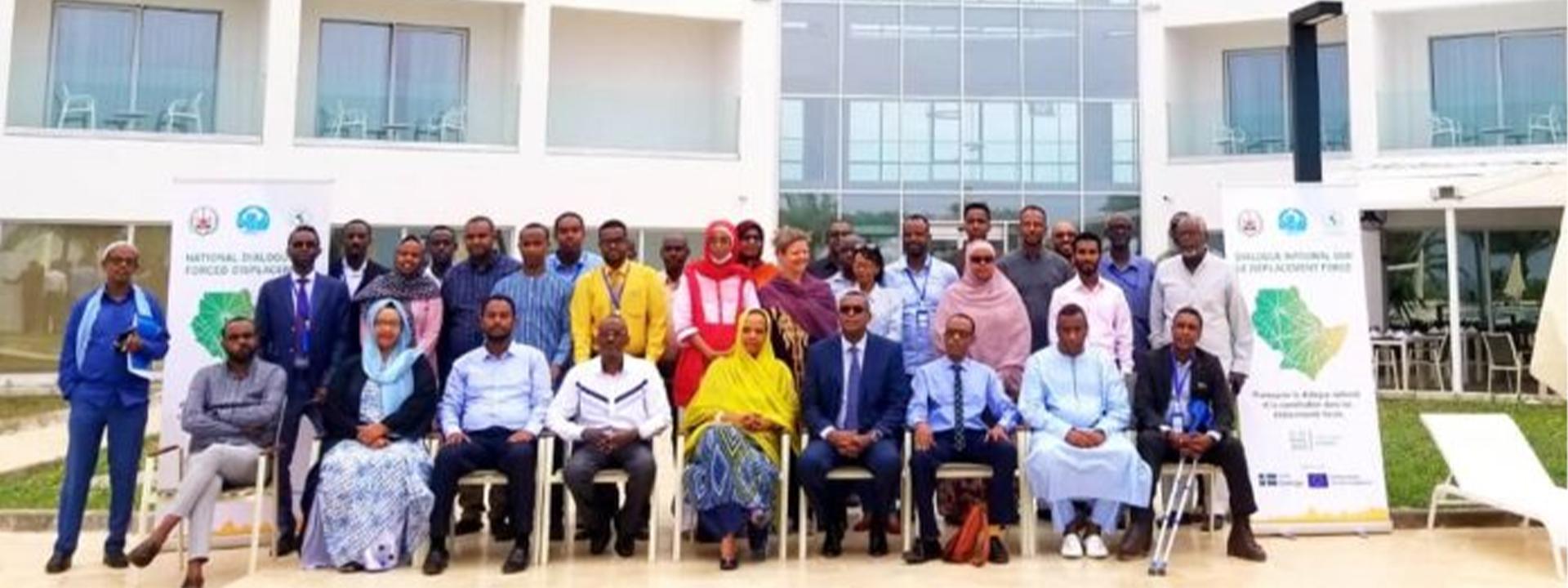March 13, 2023 (TADJOURAH, Djibouti): The Intergovernmental Authority on Development (IGAD) conducts a three days’ workshop on Djibouti National Dialogue on Forced Displacement, to strengthen the government’s coordination efforts between national, regional and global refugee management initiatives and provided recommendations for Government of Djibouti and partners.
The objective of the Djibouti National dialogue was to identify and discuss government initiatives to combat forced displacement, to share the general state of progress and take stock of the implementation of commitments to contribute to the preparations for the world forum on FMR refugees, to identify the challenges and areas requiring additional support to the government in the fight against forced displacement.
In her opening remarks, Madam Fathia Alwan, Director for Health and Social Development, IGAD, underlined that many displaced populations struggle to break free from the cycle of dependence on humanitarian aid and find durable solutions.
“We wish to support our Member States in documenting their key achievements, challenges and opportunities in the implementation of the Comprehensive Refugee Response Frameworks, the Nairobi process and the thematic declarations.” Madam Fathia noted.
Furthermore the Director highlighted that Djibouti is a direct beneficiary of the Development Response to the Impact of Displacement Project (DRDIP) which has transformed refugee hosting areas through community-based initiatives.
Madam Fathia on her part reaffirmed that the IGAD stands ready to support Djibouti, financially and materially for the participation of the Global Refugee Forum to be held in the end of 2023 in Geneva.
The Prefect of the Tadjourah region Mr. Hassan Dabaleh,who made an opening speech at the ceremony, welcomed the participants and wished a Good stay in Tadjourah and called on the participants to address the root causes of forced displacement. “As a nation we have a responsibility to promote peace and stability in the region.” He added.
The Secretary General of the Ministry of the Interior Mr Siraj Omar Abdoulkader, urged that the dialogue should make it possible to identify the springs and implications of forced displacement and the protection and assistance offered to refugees in Djibouti.
On his remarks, Mr Houssein Hassan Darar Executive Secretary of the National Office for Assistance to Refugees and Victims (ONARS) on his part mentioned that significant progress has been made because today refugees are fully integrated into our education, health and social protection systems, and the labor market is wide open to them.
“Today, we are on the eve of the Global Refugee Forum scheduled for next December. It is also up to us to review together the government’s initiatives to combat forced displacement and to take stock of the implementation of the commitments made since then.” He stressed.
Saying that the Republic of Djibouti is an epicenter of forced displacement in the region, with nearly 35,000 refugees and asylum seekers, all supported by the government through ONARS, Mr Houssein Hassan Darar added saying: “I am particularly proud to announce that ONARS, with the support of IGAD, is engaged in a national dialogue to strengthen the coherence of ongoing initiatives on the management of refugees’ plans to engage various stakeholders.”
It is stated on the occasion that Djibouti is a major transit point for migrants and refugees to and from the Arabian Peninsula via Yemen. It hosts approximately 34, 990 refugees and asylum seekers from the neighboring countries and continues to receive simultaneous arrivals from Somalia, Ethiopia, and Yemen. Now a day, Djibouti faces unique migration and forced displacement challenges due to its crossroads connecting Europe, Asia and Africa.
The national dialogue brought together government agencies, international and national humanitarian and development partners offering protection and assistance to refugees in Djibouti.
The Swedish government and the EU provided the financial and technical supports for the Djibouti National Dialogue on Forced Displacement workshop.
It is stated on the end of the workshop that the recommendations of the national dialogues are government-led platforms to facilitate stakeholders’ engagement, cooperation and partnership in the area of forced displacement , to amplify the IGAD aims to support member states in following up on their pledges, commitments and regional initiatives under the Support Platform.
It is to be remembered that since 2016, Djibouti has been one of the pilot countries implementing the Comprehensive Refugee Response Framework.

